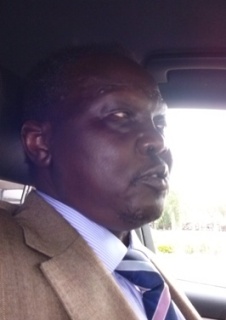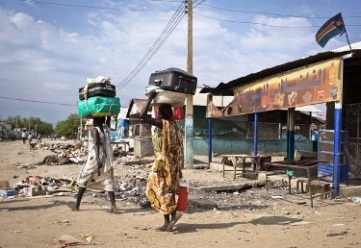Upper Nile witnessing “phenomenon” of killings: MP
March 13, 2014 (JUBA) – Fighting between government and rebel forces in South Sudan’s Upper Nile state has left infrastructure in ruins and about half a million people without food and shelter, a state MP said in Juba on Thursday.

Asked about allegations of tribal killings, Akolawin, who is the state representative for the ruling Sudan People’s Liberation Movement (SPLM) in Upper Nile, said it was “unfortunate” that fighting had degenerated into targeted tribal violence.
“The rebels are mainly Nuers. When they arrived in the town they targeted others (non-Nuer) for the reasons we don’t know,” he said.
Malakal has changed hands three times since conflicted broke out in mid-December when fighting erupted between soldiers aligned to former vice-president Riek Machar, a Nuer, and those loyal to president Salva Kiir, who is from the Dinka ethnic group.
The Upper Nile state capital, Malakal, some 500km north of Juba, is one of three state headquarters, along with Bor in Jonglei and Bentiu in Unity state, that witnessed intense clashes throughout the conflict.
REBELS DENY ATROCITIES
Since being retaken by rebels in late February, there have been reports of arbitrary killings and widespread destruction in Malakal, with dead bodies left to rot in the streets and both sides accusing each other of atrocities. MP Akolawin said most of the victims are elderly people who were too ill or frail to flee when violence erupted.
“Others thought that they are above this ethnicity because they have served the people of South Sudan all their lives. The last attack was very bad,” he said.
James Gatdet Dak, the spokesperson for rebel leader Riek Machar, dismissed allegations that rebel forces were responsible for committing atrocities in the state, blaming government troops for carrying out attacks on Nuer and Shilluk civilians.
“Government’s forces together with their foreign allies were responsible for the barbaric massacres of civilians and destruction of public and private properties in Malakal, as well as in other areas they have recaptured from our resistance forces,” Dak told Sudan Tribune on Friday.
He accused the government of dismantling phone networks after troops loyal to Kiir recaptured the strategic town from opposition forces in January, so that door-to-door searches and targeted killings could not be effectively communicated to the outside world by victims.
He added that when the rebels entered the town for the second time in February, they had discovered a “very horrible” situation, accusing government forces of killing hundreds of civilians in “cold blood”, including Nuer church pastors, who did not make it to the UN compound for protection.
COMMUNITIES TORN APART
Akolawin has described current conditions inside Upper Nile state as unprecedented.
Prior to the recent surge in violence, the MP said various communities had been living together peacefully and had never before witnessed such wide-scale destruction.

“The people of Upper Nile have been living together, but what we are witness now is a new phenomenon. It is very bad. Everybody is a target, so people are all on the move because if you [are] found, you are killed,” he added.
He said large numbers of displaced were getting no help from the government or UN agencies, warning of a worsening “humanitarian disaster”.
“The humanitarian aspect is not being addressed [and] the government seems to be only busy with war,” he said.
In a strongly worded statement issued on 10 March, members of the Collo tribe condemned the killing of innocent unarmed civilians in Upper Nile after their villages were also reportedly targeted by rebel forces.
Dak, meanwhile, accused government’s forces of expanding their attacks on non-Dinka civilians, adding that attempts to conceal their acts by blaming opposition forces is “unacceptable”.
He maintains that thousands of civilians who took refuge at the UN base in Malakal in February had done so out of fear for government troops.
He claims that in addition to Nuer and Shilluk civilians, some members of the Dinka Bor community suspected of disloyalty towards Kiir were also targeted by government troops.
(ST)
